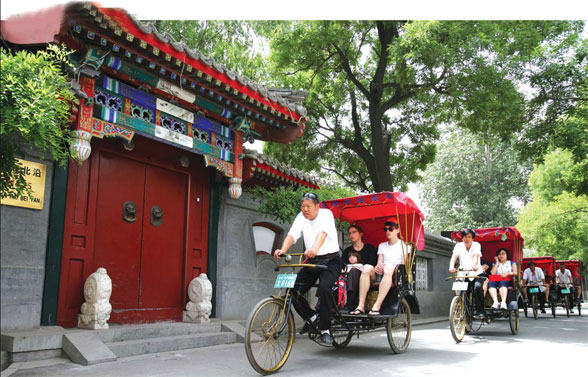New life cycle
 0 Comment(s)
0 Comment(s) Print
Print E-mail
China Daily, May 31, 2008
E-mail
China Daily, May 31, 2008

Dawn breaks and Ying Huiqi beats off the dust that has collected on the vehicle overnight, tests the bell on the copper handlebar, folds up the awning and gets ready to receive his first customer of the day. Clad in a white T-shirt and black bloomers, with a pair of traditional fabric shoes and a towel hung at the waist ready for wiping his perspiration, Ying is in his element. "Watch your step," he says cheerfully. "Sit back. Now off we go."
He sets out for innermost Beijing, into its hutongs, or quintessential alleyways. The Beijinger has been riding his trishaw for 11 years in the Shichahai area, northwest of the Imperial Palace.
Spring and summer are busy tourist seasons, so Ying pedals more than 10 customers every day. The sun has burned his skin, with his neck as tanned and rough as an old peasant toiling the fields year round. He is 58, but Ying professes to have "inexhaustible strength". Ying believes he offers a reflection of Beijing culture and civilian life in these modern times.
He often recites to foreigners the story of Camel Xiangzi or Luotuo Xiangzi, the Lao She masterpiece of the tragic life of a rickshaw puller in Beijing of the 1920s. Like many, Ying believes that Xiangzi best represents the era of old Beijing.
Xiangzi was a modest rickshaw puller in the capital, but one who dreamed of a rickshaw to call his own. Through Xiangzi's eyes, the old Beijing of just a few decades ago was shown to readers, such as the Bell and Drum towers, the White Dagoda, the pailou or archways, bustling markets and, of course, the life of Beijingers in hutongs.
"But what a miserable life Xiangzi had!" Ying says. "Under the scorching sun, in the rain and snow, he waded through all types of difficulties until he succumbed to his failures. On the contrary, I am happy to pull this trishaw."
Ying was not always a trishaw rider. After graduating from college in 1966, he got caught up in the "cultural revolution" (1966-76) and was assigned to an electrical plant in Qinghai province. With his proficiency in welding, Ying became the backbone of the factory and was invited to join the Association of Qinghai Welding and helped to revive a collapsing private welding plant. But Ying considered time and again to return to the capital. "It was like a calling only in Beijing was I able to feel at home," he says.
Go to Forum >>0 Comment(s)